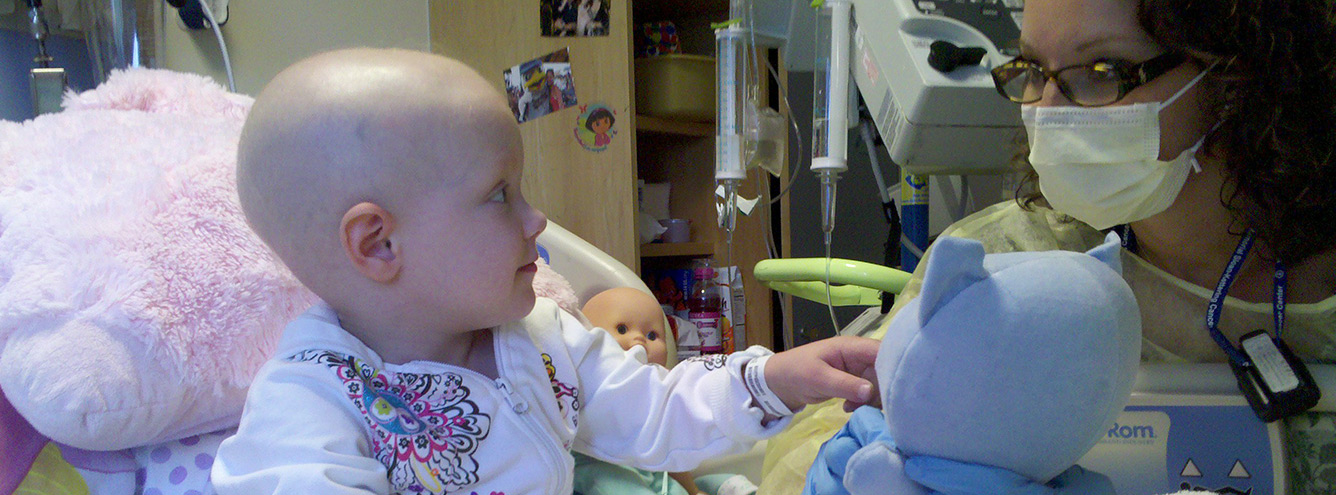Children with retinoblastoma can become dangerously ill very quickly due to side effects of chemotherapy.
White blood cells that fight infection are depleted by chemotherapy. Counts are usually at their lowest about 7-14 days after treatment.
If your child develops a fever or is exposed to chickenpox or measles, you will need to return to hospital for tests and treatment. Chickenpox and measles can be life threatening, so prevention is best.
Vomiting and diarrhoea can cause serious dehydration rapidly in babies and young children. Medical care is vital to replenish the body’s fluid and nutrient supply.
Shared care may have been arranged with a hospital near your home if the main treating hospital is far away. Make sure you know who to contact and where to go if your child becomes unwell between treatments.
Vaccinations
DO NOT allow vaccinations or immunizations while your child is on treatment. Some vaccines use a “live virus” which could be potentially fatal to your child. The oncologist will advise when immunizations can be given after treatment.
If your child is accidentally given a vaccine or immunization, contact the oncologist immediately. Your child should also avoid contact with anyone who has received a vaccination within the last four weeks.
Signs of Infection
Some parents are reluctant to call their child’s doctors with questions or concerns. However, it is important to discuss your concerns with the doctor. You should contact the doctor immediately if your child experiences any of the following:
- Oral temperature above 38°C (100.4°F)
- Underarm temperature of 37.4°C (99.4°F)
- Shivering or chills
- Headache and stiff neck
- Runny nose, sore throat or earache
- Coughing or breathing difficulties
- Blisters, rashes or sores on the skin
- Severe nausea or vomiting (see below)
- Constipation that lasts more than 48hours
- Severe diarrhoea
- Painful urination or bowel movements
- Blood in urine or stool
- Exposure to chicken pox or measles
- Unexplained or persistent bleeding, bruising, or cuts that won’t heal
Dehydration
Vomiting causes the body to lose water and nutrients. Dehydration can be very serious in infants and young children. Call the doctor if your child is vomiting more than three times a day and is not drinking enough fluids to replace those lost.
Symptoms of mild to moderate dehydration:
- Dry mouth.
- Few or no tears when crying.
- Soft spot on an infant’s head looks sunken, or flatter than usual.
- Headache
- Fussy behavior in infants.
- Dark urine
- Fewer than six wet nappies/diapers per day in an infant.
- More than 4 to 6 hours without a wet nappy/diaper in infants less than 6 months old.
- No urination for 6 to 8 hours in children.
- Despite dehydration, child still has strong pulse and normal heart rate
Symptoms of severe dehydration:
- Very dry mouth that looks “sticky” inside
- Sunken eyes
- Sunken soft spot (in infants)
- Flushed, dry, wrinkled, or doughy skin, especially on the belly, upper arms and legs
- Headache
- Muscle cramps
- Inactivity or decreased alertness
- Child appears weak or limp
- Excessive sleepiness or disorientation
- Deep, rapid breathing
- Fast or weakened pulse
- No urination for more than 6 to 8 hours in infants
- No unrination for more than 8 to 10 hours in children


